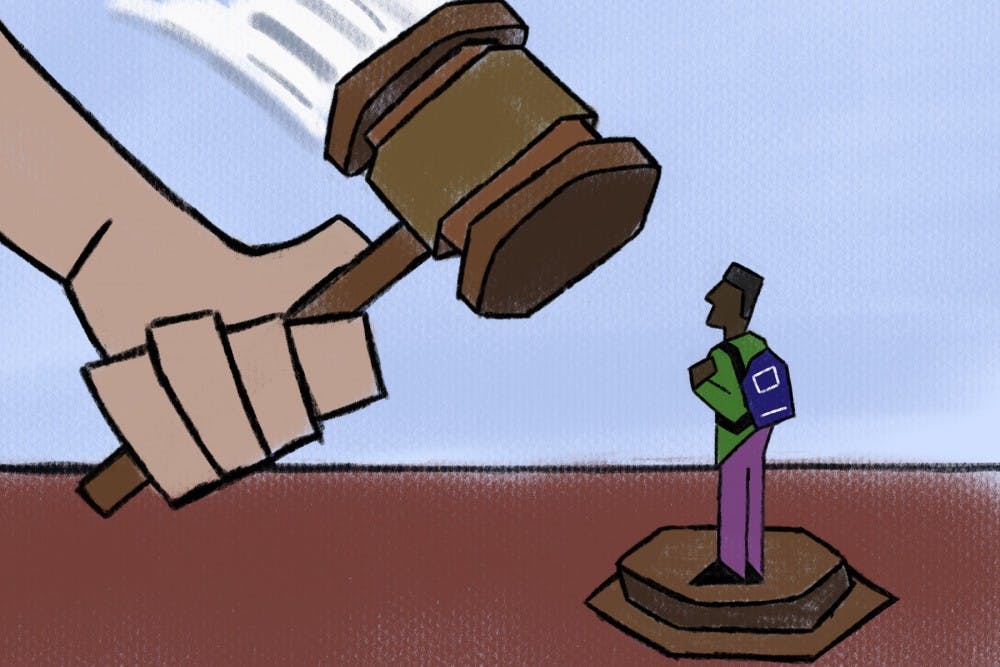Before beginning, I feel the need to affirm that I fully believe in punishing those that commit sexual crimes. In cases of sexual assault, a person is robbed of his or her right to bodily safety and autonomy.
Those are rights that I hold sacred, but they are not the only rights I hold sacred. That is to say, despite the seriousness of sexually charged crimes, all humans still have rights, even if they are accused of such a serious infraction. These rights include the presumption of innocence until guilt is proven, the right to a fair and impartial adjudication and the right to prepare a defense with the counsel of experts.
These are rights codified by the highest law of the land in our country and would be assumed to cover every person within. However, that is not always the case, as commonly noted in Title IX investigations.
Title IX bans sexual discrimination in public education. Along with the law's requirements for equal admission and accommodation, there is the assumed responsibility for institutions to address sexual violence on campus.
However, school administrators are not trained investigators, mediators and adjudicators, yet they are still expected to perform those roles. This leads to a wide range of cases where schools botch investigations in which the rights of victims and accused are violated.
This has led to a considerable amount of scrutiny, culminating in Education Secretary Betsy DeVos’ announcement on Thursday, Sept. 7, that the Department of Education would be starting a process to replace current enforcement guidelines.
What seems to be the biggest issue on the mind of Secretary DeVos is the standard by which universities find students guilty.
The standard that is used is called "preponderance of the evidence," meaning that whoever is making the final decision must decide that the accused is more likely guilty than not. That is, they must be 50.1 percent sure of their verdict before handing it down.
This is the same standard used for any code of conduct violation, including plagiarism, disruptive behavior and alcohol on campus. This can be problematic considering the seriousness and the biases at play here.
One common bias is that against people of color. According to Harvard Law professor Jeannie Suk Gersen, “Most of the complaints (administrators and faculty members) see are against minorities.”
While race is not formally tracked by the federal government in cases of campus sexual assault, it cannot be denied that American history contains many cases of men of color being falsely accused and wrongly punished.
It is important to make the distinction that college Title IX hearings are not courts of law, and therefore are not held to the same standards. One of those standards is that, for the most part, U.S. courts are open to the public. This allows abuses of power to be seen and condemned, which is not the case for campus investigations, but it should be.
As people move to address racial bias in our courts, we need to also address it on university campuses.
While the Department of Education has yet to form new guidelines, one change that can be made is that “both parties should have access to legal assistance,” Alesha Durfee, Ph.D, professor of women and gender studies at ASU, said.
Rape is too sensitive an issue to force students to hash it out in front of administrators, as in a civil case.
There should be an office of investigators separate from the individual universities. This would promote fairness for the students. Having trained investigators should make cases more thorough and less likely to be ignored or hidden by a university that is overly concerned about its athletes.
The final suggestion is to have clear standards of how an investigation is to be handled under Title IX law. As it currently stands, there are not many legally binding rules on the book, merely recommendations that have been sent out via letter. This has led to some of the most ridiculous cases of Title IX abuse because there are no standards between universities.
Sexual assault deserves to be addressed by educational institutions, a view shared by the current Secretary of Education. However, there needs to be unambiguous, legally binding rules about how sexual crimes are handled, and transparency in the process.
Reach the columnist at cwitt2@asu.edu or follow @WittCorbin on Twitter.
Editor’s note: The opinions presented in this column are the author’s and do not imply any endorsement from The State Press or its editors.
Want to join the conversation? Send an email to opiniondesk.statepress@gmail.com. Keep letters under 500 words and be sure to include your university affiliation. Anonymity will not be granted.
Like The State Press on Facebook and follow @statepress on Twitter.




